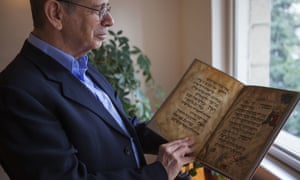
Grandchildren of one of the earliest Jewish victims of the Nazis are laying claim to a jewel of Israel’s top museum: the world’s oldest illustrated Passover manuscript.
The family of a Jewish German lawmaker say the famed Birds’ Head Haggadah, a 14th-century copy of the text read at Jewish dinner tables on Passover, was stolen from their family during the Nazi era and sold without their consent 70 years ago to the predecessor of Jerusalem’s Israel Museum in what they call a “longstanding illegal and moral injustice”.
The world’s oldest illustrated Haggadah, which tells the biblical tale of the Israelite exodus from Egypt, has long puzzled scholars with its peculiar drawings of figures with birdlike heads.
Now a US lawyer, who restored looted artworks by Gustav Klimt to their Jewish heir, is taking on the case.
The medieval manuscript is on show in a darkened room at the museum in a special exhibit ahead of the Passover holiday, which begins on Friday. The family wants it to remain there but has asked the museum to pay compensation and rename the manuscript after the family, or face a lawsuit.
The family’s demands are delicate, because they are levelled at the leading museum of a country that gave refuge to Holocaust survivors and has long seen itself as caretaker of the cultural artefacts of Holocaust victims.
“We want a compromise,” said Eli Barzilai, 75, who lives in Jerusalem. He is leading the restitution demand on behalf of cousins in the US and Berlin. He said the manuscript is so rare, its value is priceless.
The Art Newspaper, which first reported the ownership claim, said the family was seeking “less than” $10m (£7m), but neither Barzilai nor the family’s lawyer would cite an exact figure. “If we go to court there’s no turning back,” he said.
Barzilai says the Haggadah was a wedding gift from his grandmother’s family to his grandfather, Ludwig Marum, a lawyer in Karlsruhe who served in Germany’s parliament and opposed Hitler. The Nazis paraded Marum in the town before taking him away. He was later murdered at Kislau concentration camp
No comments:
Post a Comment